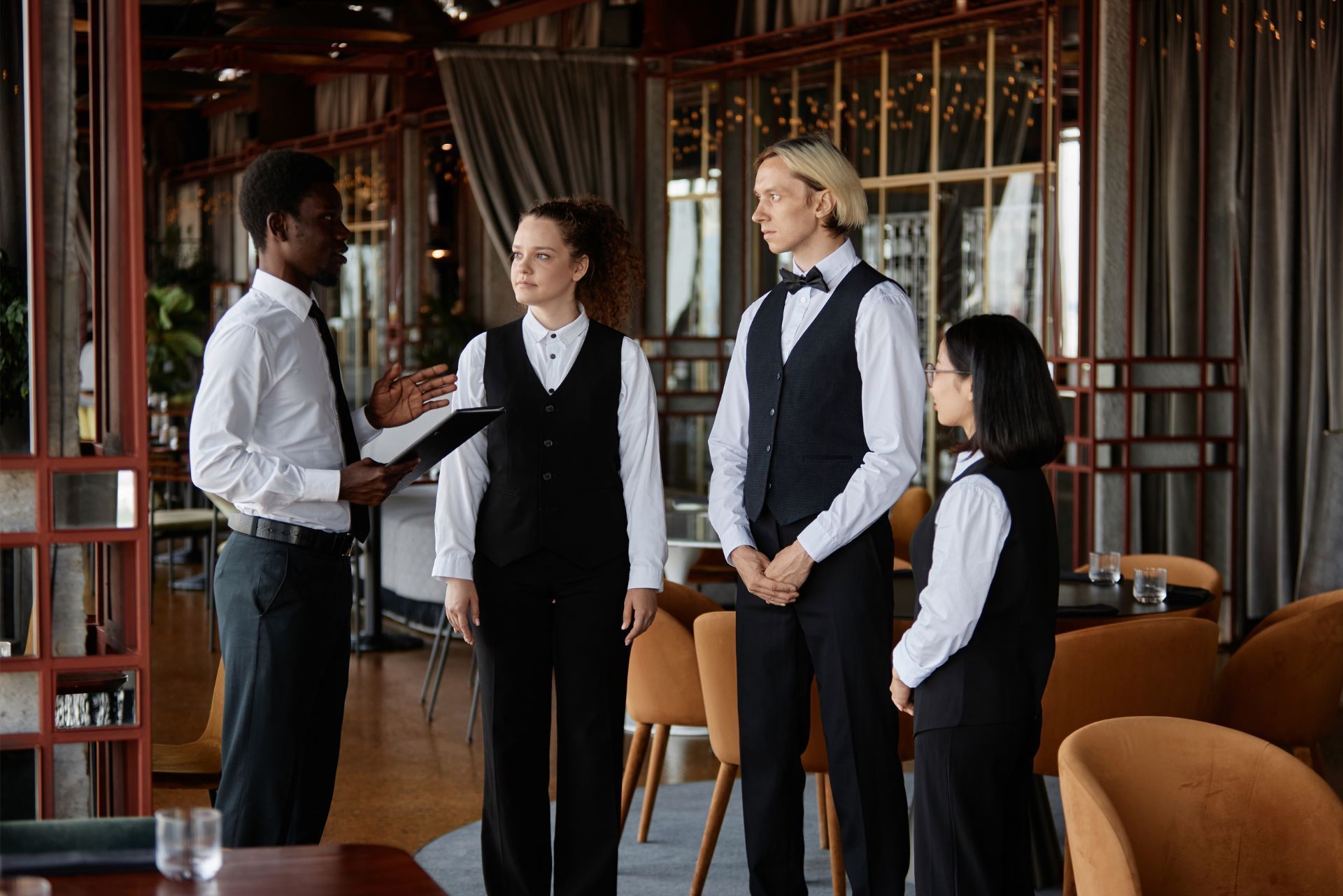Top 3 Recommended Policies

By: Lance Hale
Licensed Commercial Insurance Specialist
425-320-4280
Why Hospitality Insurance Matters in Washington
From bustling Seattle cafés to boutique inns nestled in the Cascades, the Evergreen State’s hospitality scene is both vibrant and fiercely competitive. According to the Washington Hospitality Association, the industry employs more than 300,000 people and generates roughly $23 billion in annual sales. That scale brings considerable economic opportunity—but it also exposes owners and managers to an equally large spectrum of risks. Property damage from winter storms, liability claims stemming from tourist slip-and-falls, and cyberattacks on reservation systems all routinely affect hospitality establishments across the state.
Insurance serves as the financial backbone that enables restaurants, hotels, bars, and food trucks to weather these events without derailing operations. In a region where minimum wage ranks among the highest in the country and regulatory fines can quickly escalate, an uninsured or under-insured loss can bankrupt even a thriving business. The right policy portfolio not only protects assets but also satisfies state requirements, reassures investors, and builds confidence among employees and guests.
Moreover, the unique geography of Washington adds another layer of complexity to the hospitality industry. With its stunning coastlines, majestic mountains, and dense forests, the state attracts millions of tourists each year. However, this influx can lead to increased liability risks, particularly in outdoor venues or establishments that offer adventure tourism. For instance, a kayaking tour company might face claims if a guest suffers an injury while navigating the waters of the Puget Sound. This highlights the importance of specialized coverage that addresses the specific needs and risks associated with different types of hospitality businesses.
Furthermore, as the industry continues to evolve with technological advancements, hospitality insurance must adapt to cover emerging threats. Cybersecurity is a growing concern, especially as more establishments rely on digital booking systems and customer data management. A data breach could not only lead to significant financial losses but also damage the reputation of a business, making it crucial for owners to invest in cyber liability insurance. This type of coverage can help mitigate the financial fallout from such incidents, allowing businesses to recover more swiftly and maintain customer trust in an increasingly digital world.
Key Risks Facing Washington Hospitality Businesses
Owners often imagine dramatic events like kitchen fires, but everyday exposures are far more common—and costly. Nationwide claim data show that slip-and-fall incidents represent nearly 40 percent of liability payouts in restaurants, and Washington’s rainy climate amplifies that risk. Wet entryways, slick sidewalks, and uneven historic flooring can all lead to injuries and expensive medical settlements. Additionally, the age of many establishments in Washington means that maintenance issues, such as loose railings or worn-out carpets, can exacerbate these risks. Regular inspections and proactive maintenance are crucial for minimizing liability and ensuring the safety of both patrons and staff.
Natural disasters present another major threat. Western counties contend with atmospheric rivers and occasional flooding, while Eastern Washington faces wildfire seasons that seem to lengthen each year. The National Interagency Fire Center recorded more than 600,000 burned acres statewide in 2023 alone. Smoke damage can spread hundreds of miles from the source, closing lodging properties just as peak tourist season arrives. Moreover, the economic impact of these disasters extends beyond immediate physical damage; they can disrupt supply chains, leading to shortages of essential goods and services, and deter tourists from visiting affected areas, further straining local businesses.
Cyber exposure rounds out the top tier of hazards. Hospitality databases hold troves of credit-card and passport details, making them prime targets for ransomware gangs. A 2022 FBI Internet Crime Report ranked Washington among the ten states with the highest number of reported business email compromise (BEC) incidents, underscoring the need for robust cyber coverage and response planning. As technology continues to evolve, so do the tactics of cybercriminals, making it imperative for hospitality businesses to invest in ongoing employee training on cybersecurity best practices. Regular updates to software and systems, along with the implementation of multi-factor authentication, can significantly reduce the risk of breaches and protect sensitive customer information.
Core Insurance Policies Every Washington Hospitality Operation Should Consider
General Liability Insurance (GL)
General Liability forms the cornerstone of any hospitality program, covering bodily injury, property damage, and personal injury claims. Whether a diner trips on a rug in Spokane or a guest alleges false advertising in a Yakima winery’s brochure, GL helps cover legal fees, settlements, and judgments. Most carriers offer base limits of $1 million per occurrence and $2 million aggregate, though higher limits are prudent for high-volume venues or properties hosting large events. Additionally, it is essential for hospitality operators to understand the nuances of their GL policy, as certain exclusions may apply, such as those related to specific activities or events. Regularly reviewing and updating the policy can help ensure that it adapts to changing business needs and emerging risks, especially as venues expand their services or host unique events.
Liquor Liability Insurance
Washington’s Liquor and Cannabis Board (LCB) enforces strict dram-shop laws that hold establishments responsible if they overserve an intoxicated patron who later causes injury. Liquor Liability, sometimes sold as a separate endorsement, pays for the legal defense and damages arising from such incidents. Policies often extend coverage to assault and battery claims—a vital addition for nightclubs or late-night bars in Seattle’s Capitol Hill neighborhood. Furthermore, operators should consider implementing comprehensive training programs for staff to recognize signs of intoxication and manage patron behavior effectively. Such proactive measures not only enhance safety but can also positively influence insurance premiums over time, as insurers may reward establishments that demonstrate a commitment to responsible service.
Commercial Property Insurance
This policy reimburses owners for damage to buildings, furnishings, kitchen equipment, and inventory caused by fire, windstorm, vandalism, and other perils. Because Washington’s coastal areas face heightened earthquake risk from the Cascadia Subduction Zone, many carriers exclude shake damage unless a separate earthquake endorsement is purchased. Business interruption coverage—an invaluable supplement—replaces lost income while repairs are underway, ensuring cash flow remains steady even when rooms or tables sit empty. Additionally, operators should consider the importance of maintaining an up-to-date inventory of their assets, as this can streamline the claims process in the event of a loss. Regular property assessments can also help identify vulnerabilities and inform risk management strategies, ultimately leading to safer and more resilient operations.
Workers’ Compensation
State law mandates Workers’ Compensation for all employees, including part-timers. Hospitality ranks among the top five industries for workplace injuries nationwide, driven by strains, cuts, and burns. Washington’s Department of Labor & Industries (L&I) administers its own monopolistic fund, so employers must purchase Workers’ Comp directly through L&I or qualify to self-insure. Failing to do so can result in daily penalties, stop-work orders, and criminal charges. To mitigate the risk of workplace injuries, hospitality operations should invest in ongoing safety training and ergonomic assessments, fostering a culture of safety that prioritizes employee well-being. By actively engaging employees in safety initiatives, businesses can reduce claims and create a more productive work environment.
Cyber Liability Insurance
Cyber policies cover expenses related to data breaches, ransomware, and network outages. For hotels using cloud-based property management systems or restaurants processing thousands of card transactions daily, coverage may include forensic investigation costs, customer notification, credit monitoring, and lost revenue from system downtime. Many underwriters also provide access to breach coaches who guide insureds through regulatory reporting requirements set by Washington’s data-breach notification law. As cyber threats evolve, it is crucial for hospitality businesses to stay informed about the latest security measures and best practices. Implementing robust cybersecurity protocols, such as regular software updates, employee training on phishing scams, and multi-factor authentication, can significantly reduce the likelihood of a breach and enhance overall resilience against cyber threats.

Washington-Specific Legal Requirements and Regulations
Beyond Workers’ Compensation, several state and local rules shape insurance decisions. Food-handling establishments, for example, must show proof of at least $2 million in liability limits before securing a permit for a temporary event such as a farmers market or festival booth. Cities like Tacoma and Spokane occasionally raise those minimums for gatherings exceeding 10,000 attendees.
Short-term rentals, a rapidly growing niche in communities from Leavenworth to Ocean Shores, fall under distinct ordinances. Platforms such as Airbnb may provide limited host protection, but many municipalities require property owners to carry their own $1 million liability policy and name the city as an additional insured. Failure to comply can jeopardize license renewal and trigger fines of up to $1,000 per day.
Finally, Washington’s Paid Family and Medical Leave (PFML) program, funded via payroll premiums, can interact with Employers’ Liability insurance. Although PFML covers wage replacement, employers remain vulnerable to lawsuits alleging wrongful denial of leave. An Employment Practices Liability (EPLI) endorsement, while not mandated, helps bridge that gap.
Cost Factors and Premium Benchmarks
Hospitality insurance rates in Washington vary widely based on location, revenue, building age, claims history, and the presence of high-risk exposures like deep-fat fryers or live entertainment. Nonetheless, statewide benchmarks offer a useful starting point:
• General Liability: Small cafés with annual sales under $500,000 often see premiums between $1,100 and $1,800. Mid-size restaurants grossing $2 million may pay $4,000–$6,000.• Liquor Liability: Adding alcohol service typically adds $2–$5 per $1,000 of liquor receipts. A bar with $700,000 in liquor sales could spend $1,400–$3,500 annually.• Commercial Property: Replacement-cost rates average $0.45–$0.70 per $100 of insured value in Western counties, climbing to $0.80–$1.10 in wildfire-prone Eastern regions.• Cyber Liability: Stand-alone policies start around $750 for $1 million in limits, though sophisticated hotels processing international bookings may pay $5,000 or more due to higher data exposure.
Implementing risk-mitigation measures—sprinkler systems, routinely updated Point-of-Sale security patches, or server training—can shave 10 percent or more off premiums. Bundling multiple lines with one carrier further reduces administrative costs and can unlock package discounts.
Claims Scenarios and Lessons Learned
Case studies illustrate just how quickly losses escalate in the hospitality world:
The Steam Table FireA Bellevue buffet experienced a $420,000 loss when a worn electrical cord ignited a steam table overnight. Property coverage paid to rebuild the line, replace food inventory, and restore smoke-damaged décor. However, business interruption coverage was capped at 30 days, leaving the owner to absorb two weeks of unpaid downtime. The incident underscores the importance of accurately projecting how long repairs truly take amid supply-chain delays.
The Dram-Shop JudgmentIn Spokane Valley, a tavern settled for $1.2 million after a patron it served injured a pedestrian. Surveillance footage showed servers failed to cut the customer off. Though the tavern carried Liquor Liability, its limits stopped at $1 million, forcing the owner to negotiate a payment plan for the balance. Up-and-coming establishments can avoid a similar fate by matching insurance limits to worst-case scenarios rather than minimum legal requirements.
The Ransomware LockoutA waterfront hotel in Tacoma lost access to its booking system for five days when hackers encrypted servers and demanded 8 bitcoin. Cyber coverage funded forensic consultants and the eventual $180,000 ransom, but the policy’s business income sublimit of $50,000 covered only half of lost revenue. Management has since increased its cyber limits and deployed multi-factor authentication for all back-office logins.
Risk Management Best Practices
While coverage cushions financial blows, prevention remains the most cost-effective strategy. The following tactics—endorsed by insurers and hospitality trade groups alike—can dramatically reduce claim frequency and size.
1. Safety Audits and TrainingQuarterly walk-throughs identify hazards such as frayed carpets or faulty refrigeration gaskets. Pair those inspections with mandatory server and housekeeping safety modules. According to Liberty Mutual’s Workplace Safety Index, every dollar spent on injury prevention returns more than two dollars in avoided costs.
2. Alcohol Service OversightRequire Washington Server Training (MAST) certification for all front-of-house staff, schedule regular ID-checking drills, and set clear policies for cutting off intoxicated patrons. Some insurers offer 5–10 percent premium credits for documented alcohol-safety programs.
3. Cyber HygieneInstall endpoint detection software, encrypt guest Wi-Fi networks, and segment payment systems from front-desk computers. Conduct annual penetration tests to stay ahead of evolving threats. The 2023 Verizon Data Breach Investigations Report showed that 74 percent of hospitality breaches involved stolen credentials—highlighting the simple power of strong password protocols.
How to Choose the Right Insurance Partner
Finding an insurer or broker who understands hospitality’s nuances can be the difference between a seamless claim and a weeks-long headache. Start by seeking agencies that specialize in hotels, restaurants, or events. Ask for references from similar operations within Washington; regional knowledge of L&I procedures, liquor board guidelines, and coastal earthquake risk is invaluable.
Evaluate the carrier’s financial strength through ratings from AM Best or Standard & Poor’s, and probe its claims handling track record. Fast settlements are crucial for guest-facing businesses that cannot afford prolonged downtime. Many owners also value risk-management resources—training webinars, template employee handbooks, or on-site loss-control visits—that accompany a policy.

Frequently Asked Questions
Do I need earthquake insurance if my property is outside the coastal zone?While the highest shake intensity is expected along the coast and Puget Sound, geologists note that the Cascadia fault could impact much of the state. If the building is older or unreinforced, an earthquake endorsement offers peace of mind regardless of ZIP code.
What insurance requirements apply to food trucks?Mobile food vendors must carry Commercial Auto in addition to General Liability and often need proof of $1 million in coverage to enter event grounds. If the truck uses propane or generators, confirm that the Property policy extends to equipment while in transit.
Will my landlord’s insurance cover my restaurant’s contents?No. A landlord’s policy protects the building structure but not a tenant’s kitchen equipment, furniture, or inventory. A separate tenant improvement and betterments clause under Commercial Property covers alterations such as custom bars or walk-in coolers.
Final Thoughts
Washington’s hospitality scene thrives on creativity and service excellence, but behind every memorable meal or cozy guest room lies a network of safeguards that keep doors open and staff employed. Comprehensive insurance—tailored to the state’s meteorological quirks, legal landscape, and cyber realities—anchors that safety net. By combining well-structured policies with proactive risk management, hospitality operators can focus on what they do best: delivering unforgettable experiences to residents and travelers alike.

